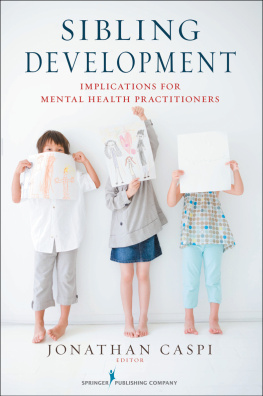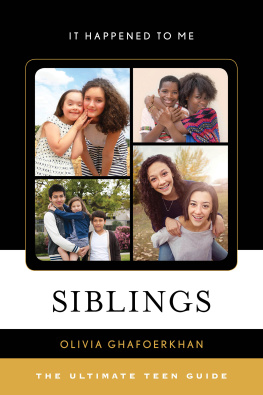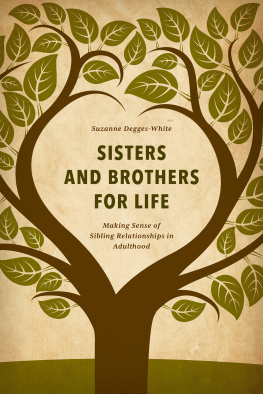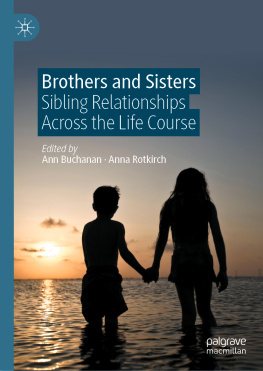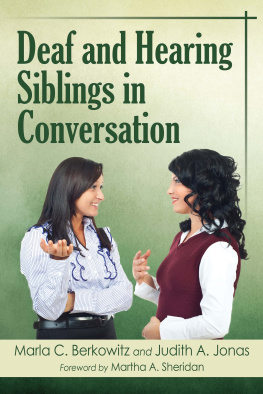Mom Loves You Best
Copyright 2010 by Cathy Jo Cress, MSW, and
Kali Cress Peterson, MS, MPA
All rights reserved. No portion of this book may be reproduced or transmitted in any form whatsoever, including electronic, mechanical or any information storage or retrieval system, except as may be expressly permitted in the 1976 Copyright Act or in writing from the publisher. Requests for permission should be addressed to:
New Horizon Press
P.O. Box 669
Far Hills, NJ 07931
Cress, Cathy Jo and Kali Cress Peterson
Mom Loves You Best: Forgiving and Forging Sibling Relationships
Cover design: Wendy Bass
Interior design: Susan Sanderson
Library of Congress Control Number: 2010925081
ISBN-13 (eBook): 978-0-88282-422-2
New Horizon Press
Manufactured in the U.S.A.
20142013201220112010/5 4 3 2 1
This book is dedicated to our siblings Harry Steven Cress,
Staci Nestaval, Jill Gallo and Scott Peterson and to Dan
Murphy, who inspired his wife to live in the here and now.
Authors Note
This book is based on the authors research, personal experiences and clients real life experiences. In order to protect privacy, names have been changed and identifying characteristics have been altered except for contributing experts. For purposes of simplifying usage, the pronouns his/her and s/he are sometimes used interchangeably. The information contained herein is not meant to be a substitute for professional evaluation and therapy with mental health professionals.
Table of Contents

M om Loves You Best is an excellent book that will help siblings learn how to forgive. This is an essential guide to assist wounded brothers and sisters develop compassion for themselves and their siblings as they navigate the aging and death of their parents. The healing power of absolution is highlighted for adult children long estranged by childhood wounds to learn to heal themselves and reconnect with each other. This is no trivial need or accomplishment. So many people come into my forgiveness trainings with unresolved childhood and adolescent issues that flare up as they move through the life cycle. It is clear to me that wounded siblings who read Mom Loves You Best will be able to start the process of caring for themselves and find how they can repair long ago childhood damage. This book skillfully teaches siblings to take responsibility for what they feel in the here and now and to learn to communicate with each other from a healthier place. The methodology in Mom Loves You Best will help move troubled people to personal peace and can be used as a template for solution, not a rehashing of personal and family strife.
Siblings, like all the people I have worked with at The Stanford Forgiveness Project, need to move from feeling like victims to healthy and happy individuals who can make peace with themselves and their long estranged family members. And let me tell you it is not easy, as little in our culture addresses this yawning need. I have listened to countless people engage in useless arguments with their brothers and sisters over estates, how to care for ill parents, attention to past wounds, selling the family home, etc. Now there is a book that addresses these issues directly.
My work for years has been to encourage people to make peace with their pasts and move on. Mom Loves You Best is a companion to my own bestselling book Forgive for Good (Harper-One). As a fellow researcher and teacher in forgiveness, I know this book will be a welcome and needed addition to the growing library of forgiveness training and help. And when practiced, the information in this book will reduce suffering in this world.
Dr. Fred Luskin
Author/Co-Founder,
Standford University
Forgiveness Project
P rior generations define your familys rules, from holiday rituals and rites of passage to how parents and children act. A generational group is a set of individuals having common cultural and societal characteristics and attitudes. Essentially, a set of laws, very often unstated, are passed on from great-grandparent to grandparent to parent to child. These play an important role in setting standards for parents to engage with their children and siblings to interact with one another. For example, these laws may dictate a gender bias (e.g. only boys should be given access to higher education). This family precedent is then passed on to each successive generation. At some point these family laws orin this examplea gender bias, create feelings of ill will between siblings and may play an important part in understanding the origins of your I Hate You story.
Finding out the environmental or economic conditions that were present in each cohort tell us the background of the parenting rules that were passed on to you. If your grandmother or great-grandmother was a part of the Greatest Generation, she lived through the Great Depression of the nineteen thirties. As a result, she may have suffered real poverty that affected how she was parented and then how she parented your mother or father or perhaps even you.
There is a cycle of modeling that occurs in all families, which imprints sibling behavior. You have to take a look back in time at our parents hourglass and then go back another generation to their parents era. This takes looking at something people in the field of aging call cohort groups or a cultural generation. A cohort is sort of a shortcut way of expressing a whole era or time in history that deeply affected the people who lived in that epoch. Historians have given cohorts names to mark the historical passages through which these people lived. Here, five cohort groups from the twentieth and twenty-first centuries are analyzed that may affect the way you and your sibling relate today. These include:
Greatest Generation
Silent Generation
Baby boomers
Generation X
Generation Y
Greatest Generation Cohorts and Siblings
Lets look at the first cohort that may have taught you or your parents how to parent siblings. If you are in midlife, your grandparents grew up in the Greatest Generation cohort. They were born within the first twenty-five years of the twentieth century. They were kids during the Roaring Twenties. The economy cooked until it burned out when they ranged in age from tweens to newly married young adults. In 1929, the Roaring Twentiesthe high-flying American way of lifeended with the spectacular economic crash of the Great Depression. Due to this financial crisis, the Greatest Generation is also often referred to as the Depression Era cohort.
During the Great Depression of the nineteen thirties, the song Brother, Can You Spare a Dime became a constant refrain when the unemployment rate verged on 25 percent. In these desperate times, the economy may have buckled, but what held together was the family. Kin stayed as one tight knit unit as parents, brothers and sisters stuck to one another through thick and thin. And during the Great Depression, there was a lot of thin. Family was the center of the impoverished universe everyone inhabited. Fathers may have been out of work, but siblings worked when they could and many dropped out of high school to help feed their families. In this bread line economy, divorce was unheard of and stepfamilies happened only if children were given away due to their own parents inability to feed and clothe them.
When World War II broke out, the American economy resurged, effectively ending the Great Depression. It was at this transition when the Depression Era Generation became what many know as the Greatest Generation, a term for this cohort coined by legendary NBC news anchor Tom Brokaw. Young men from this generation joined the war effort
Next page


